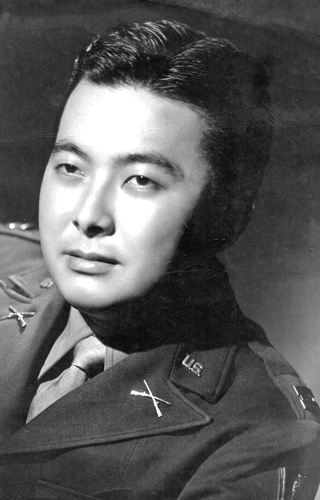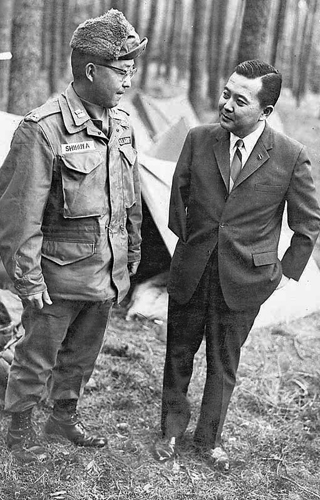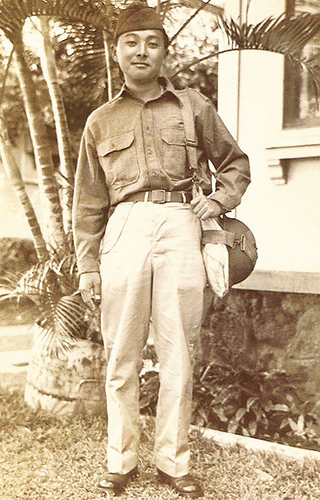Go for broke

Inouye, in his Army uniform at left, was among the last recruits to the 442nd Regimental Combat Team. As a first lieutenant in 1945, he heroically led his platoon in capturing a ridge from the Germans in Italy.

Inouye speaks with Capt. Henry T. Shibuya in Spesbach, Germany.

Inouye, pictured before World War II, was first passed over by the Army because he was already helping the American Red Cross.



« Previous article: Honor and loyalty (2 of 9)
Inouye, a sergeant when the 442nd landed in Europe, was promoted to first lieutenant as the nisei moved through Italy, then France, then back to Italy in the waning days of the war. The 442nd won a reputation for courage — its motto was "Go for Broke" — and along with the nisei in the 100th Infantry Battalion would become among the most decorated units in U.S. military history.
In his own descriptions and in the recollections of others, Inouye was a leader who genuinely cared for his men and lost few in battle. He was not a saint. He acknowledged running a lucrative craps game.
He said he once used a church tower as an observation post. He said he took a wristwatch — which he gave away — and a gun off a German colonel. He lifted a silver ring off the hand of a dead French woman.
|
"Rarely has a nation been so well-served by a people it has so ill-treated." |
Inouye had been warned not to take risks, that the war was almost over, as he moved his platoon against the Germans dug in along a ridge at Colle Musatello near San Terenzo in northern Italy in April 1945. But Inouye had orders to take the ridge.
Don't miss out on what's happening!
Stay in touch with breaking news, as it happens, conveniently in your email inbox. It's FREE!
According to "Americans: The Story of the 442nd Combat Team," a vivid account written by Army Maj. Orville Shirey in 1946, Inouye crawled up a slope and tossed two hand grenades into a German machine-gun nest. He stood up with his tommy gun and raked a second machine-gun nest before being shot in the stomach. But he kept charging until his right arm was hit by an enemy rifle grenade and shattered.
"And as I drew my arm back, all in a flash of light and dark I saw him, that faceless German, like a strip of a motion picture film running through a projector that’s gone berserk. One instant he was standing waist-high in the bunker, and the next he was aiming a rifle grenade at my face from a range of 10 yards," Inouye wrote in his autobiography.
"And even as I cocked my arm to throw, he fired and his rifle grenade smashed into my right elbow and exploded and all but tore my arm off. I looked at it, stunned and disbelieving. It dangled there by a few bloody shreds of tissue, my grenade still clenched in a fist that suddenly didn’t belong to me anymore."
Inouye wrote that he pried the grenade out of his right hand and threw it at the German gunman, who was killed by the explosion. He then continued firing his gun until he was shot in the right leg and knocked down the hillside. Badly wounded, he ordered his men to keep attacking, and they took the ridge from the enemy.
Within a few days after the battle, the fighting was over in Italy. Less than two weeks later, Germany surrendered.
Inouye was promoted to second lieutenant and, before he was discharged, to captain. He was nominated for the Medal of Honor, the nation’s highest military award, but received the Distinguished Service Cross and the Purple Heart with oak leaf cluster to go along with a Bronze Star. President Bill Clinton belatedly recognized Inouye and 21 other Asian-American veterans in 2000 with the Medal of Honor. "Rarely has a nation been so well-served by a people it has so ill-treated," Clinton said at the White House ceremony.
Inouye had multiple operations to treat his wounds and spent nearly two years of grueling rehabilitation on the mainland to learn how to function without his right arm, which had been amputated. He said he was fitted for a prosthetic arm and learned how to use it, but it never felt comfortable, so he preferred an empty sleeve.
Remarkably, three of the young soldiers who were treated at Percy Jones Army Hospital in Battle Creek, Mich. — Inouye, Robert Dole of Kansas and Philip Hart of Michigan — would serve with distinction in the U.S. Senate. Inouye liked to say that it was Dole, who would become the Republican majority leader and the GOP’s presidential nominee in 1996, who planted the seed of a career in politics.
When Inouye finally had his Hawaii homecoming after the war, he knew he would never be a surgeon.



